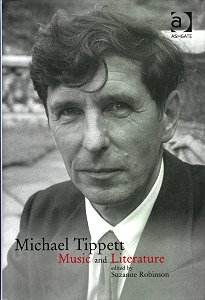This book has come about due to Suzanne Robinson completing
her doctorate research "on the influence of T.S. Eliot on Tippett".
Robinson herself supplies us with an introduction but she is also the
writer of the chapter, which is the crux of the book "From agitprop
to parable: a prolegomenon to ‘A Child of our Time’". Eight other
writers contribute essays. We also have Tippett’s own brief ‘Relation
of autobiographical experience to the created work of art’.
This collection is timely because we are reaching a
point when Tippett’s music is heard less and less in programmes throughout
Britain. I suspect that this trend is even more accentuated outside
the UK. When the composer was available in his sneakers, ill-matching
bow-tie and shirt, and striped trousers looking about 40 when we all
knew he was over 80, all was well. The work kept appearing, his achingly
long sentences transfixed us as did his personal descriptions of his
shadow and his light, his infectious laugh, his often eccentric conducting
especially of his own work. These made for wonderful times: Proms talks,
television appearances, documentaries. The trouble was that one felt
that he never let go until the day he died. He was always there to explain
his complex ideas, his obscure libretti and his life- enhancing music.
Once his presence was no longer a regular part of our lives who, apart
from Meirion Bowen, was left to promote him? This book may just be a
start, let’s hope that more will follow. One thing it certainly throws
up is the amount of research which still needs to done if we are gain
an overall picture of Tippett the complete creative artist. It also
points up what a great deal of prejudice there is to overcome.
There is prejudice concerning his libretti, which is
what Suzanne Robinson, discusses in relation to ‘A Child of our Time’
but there is also prejudice further afield. Despite gallant attempts
in Germany, Tippett’s music seems, to Meinhard Saremba, to be but little
regarded there and little heard. The 1st Symphony, and ‘Midsummer
Marriage’ have had their chances but to little avail. ‘Child of our
Time’ was hardly going to please Germans in the immediate post-war era.
When it was eventually accepted in the 1960s the language and style
were considered ‘old hat’.
Tippett’s own words act as a foreword as we read of
the authors, verses and passages which he most loved. I was surprised
to find Dickens there. The chosen lines are typical: Eliot and Yeats
at their most angular.
Edward Venn’s essay ‘Idealism and ideology in Tippett’s
writings’ spins off from Tippett’s, in which influences and sources,
mostly very eclectic ones are discussed in somewhat convoluted language.
Venn tells us that Tippett believed that having received the inspiration,
the composition was all but determined.
Inspiration being a topic which the composer was always
happy to discuss, is in the next chapter related to Tippett’s unpublished
very early String Quartet in F minor, the one probably first performed
by the Oxted and Limpsfield Players in April 1930 and the programme
for which is one of the seventeen black and white plates in the centre
of the book. This work seems to have direct inspirational links with
Beethoven’s Op. 95, which Sean Flanagan in his essay ‘Kinship and Commentary’
tells us Tippett much admired.
This symposium looks at two further and perhaps lesser-known
aspects of Tippett’s life.
Lewis Foreman on ‘Michael Tippett and the BBC’ throws
light upon the composer’s persistence in keeping his name in front of
the ‘big-wigs’ of the day and the opposition he encountered for over
a decade. Suzanne Cole in ‘Tippett, Morley College and early music’
demonstrates how his programme planning, experimentation and imagination
in the performances of Monteverdi, Purcell and Gibbons helped his cause
with the BBC. It offered the Morley College choir a place in broadcasting
schedules. It also forced the powers that be to take note of Tippett’s
work, irrespective of his compositional activity. Cole’s chapter ‘Musical
Trail-blazing’ shows that even the BBC were not too blinkered to see
that something special was happening in part of south London during
those very dark war years. This continued until Tippett’s resignation
in 1950. The legacy lives on to this day in programme planning on the
network, mixing old with new.
One thing that this book has done is to send me back
to some works which I haven’t heard for a while. These include the 3rd
Quartet mentioned by Sean Flanagan, the 1st Piano Sonata
by Lewis Foreman as one of the composers earliest broadcast successes,
and ‘The Heart’s Assurance’ (1951). The latter is fascinatingly analysed
by Barbara Docherty in a submission describing it as ‘Tippett’s War
Requiem’. This is an analogy which is most apt when one considers that
the two poets, Alun Lewis and Sidney Keyes were both victims of the
second world war. She convinces me that this work is very fine indeed.
Rowena Harrison looks at Tippett’s sources for the
opera ‘King Priam’. She demonstrates how Homer’s plot has been carefully
and very cleverly picked clean by the libretto. Each character has been
given a strong personality implied by, but not necessarily clearly discovered
through, a straight reading of Homer’s timeless ‘Iliad’. As Tippett
said: the opera is not about Greek history but about the present and
about human relationships, which are timeless.
There is much to ponder here and much to be developed.
My only regret is that the book lacks the sparkle of Tippett himself.
It is however well produced with a useful bibliography and neatly presented
musical examples especially of works not in the Schott catalogue.
Gary Higginson
